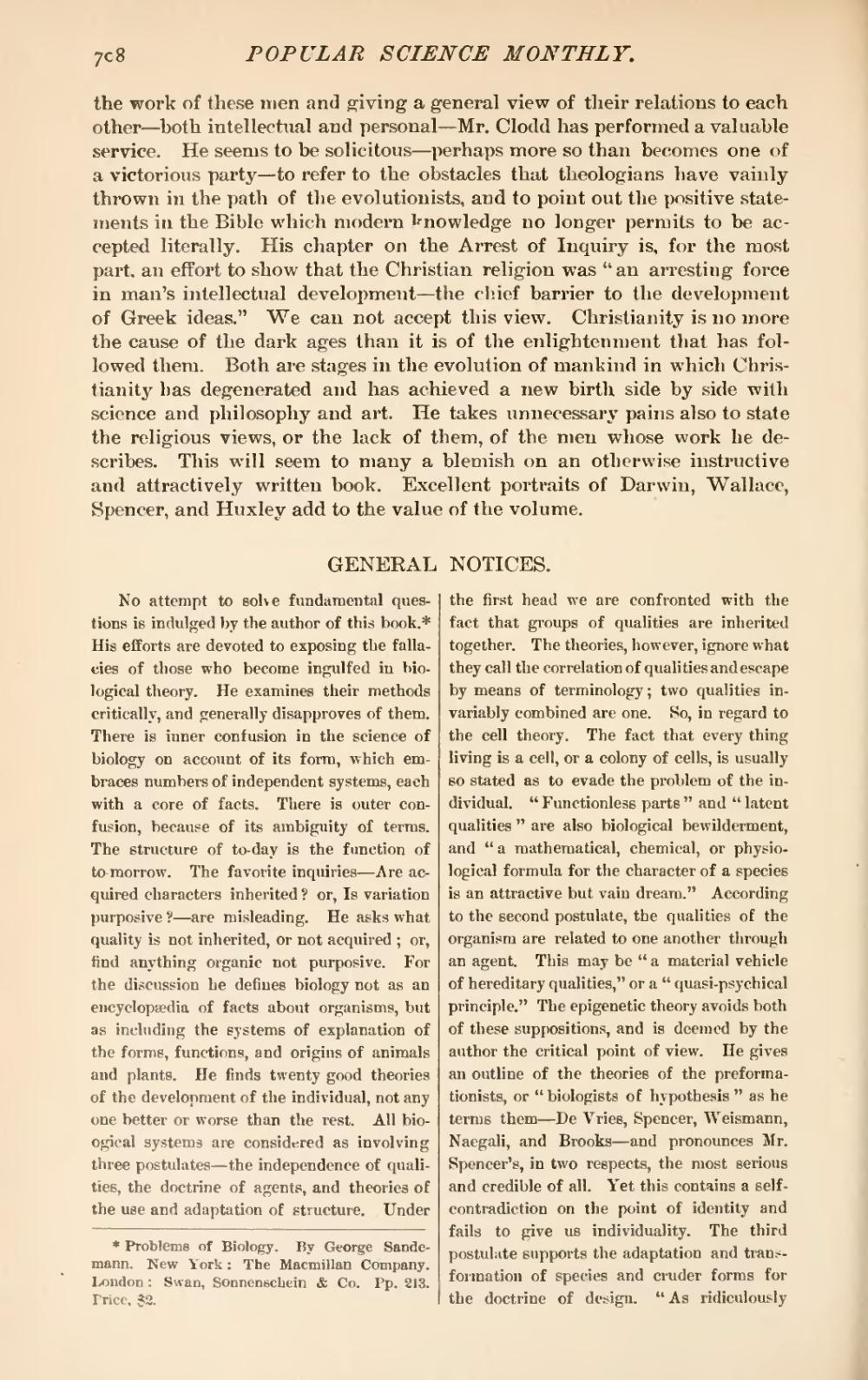the work of these men and giving a general view of their relations to each other—both intellectual and personal—Mr, Clodd has performed a valuable service. He seems to be solicitous—perhaps more so than becomes one of a victorious party—to refer to the obstacles that theologians have vainly thrown in the path of the evolutionists, and to point out the positive statements in the Bible which modern knowledge no longer permits to be accepted literally. His chapter on the Arrest of Inquiry is, for the most part, an effort to show that the Christian religion was "an arresting force in man's intellectual development—the chief barrier to the development of Greek ideas." We can not accept this view. Christianity is no more the cause of the dark ages than it is of the enlightenment that has followed them. Both are stages in the evolution of mankind in which Christianity has degenerated and has achieved a new birth side by side with science and philosophy and art. He takes unnecessary pains also to state the religious views, or the lack of them, of the men whose work he describes. This will seem to many a blemish on an otherwise instructive and attractively written book. Excellent portraits of Darwin, Wallace, Spencer, and Huxley add to the value of the volume.
No attempt to solve fundamental questions is indulged by the author of this book.[1] His efforts are devoted to exposing the fallacies of those who become ingulfed in biological theory. He examines their methods critically, and generally disapproves of them. There is inner confusion in the science of biology on account of its form, which embraces numbers of independent systems, each with a core of facts. There is outer confusion, because of its ambiguity of terms. The structure of to-day is the function of tomorrow. The favorite inquiries—Are acquired characters inherited? or, Is variation purposive?—are misleading. He asks what quality is not inherited, or not acquired; or, find anything organic not purposive. For the discussion he defines biology not as an encyclopædia of facts about organisms, but as including the systems of explanation of the forms, functions, and origins of animals and plants. He finds twenty good theories of the development of the individual, not any one better or worse than the rest. All bioogical systems are considered as involving three postulates—the independence of qualities, the doctrine of agents, and theories of the use and adaptation of structure. Under the first head we are confronted with the fact that groups of qualities are inherited together. The theories, however, ignore what they call the correlation of qualities and escape by means of terminology; two qualities invariably combined are one. So, in regard to the cell theory. The fact that every thing living is a cell, or a colony of cells, is usually so stated as to evade the problem of the individual. "Functionless parts" and "latent qualities" are also biological bewilderment, and "a mathematical, chemical, or physiological formula for the character of a species is an attractive but vain dream." According to the second postulate, the qualities of the organism are related to one another through an agent. This may be "a material vehicle of hereditary qualities," or a "quasi-psychical principle." The epigenetic theory avoids both of these suppositions, and is deemed by the author the critical point of view. He gives an outline of the theories of the preformationists, or "biologists of hypothesis" as he terms them—De Vries, Spencer, Weismann, Naegali, and Brooks—and pronounces Mr. Spencer's, in two respects, the most serious and credible of all. Yet this contains a self-contradiction on the point of identity and fails to give us individuality. The third postulate supports the adaptation and transformation of species and cruder forms for the doctrine of design. "As ridiculously
- ↑ Problems of Biology. By George Sandemann. New York: The Macmillan Company. London: Swan, Sonnenschein & Co. Pp. 213. Price, $2.

